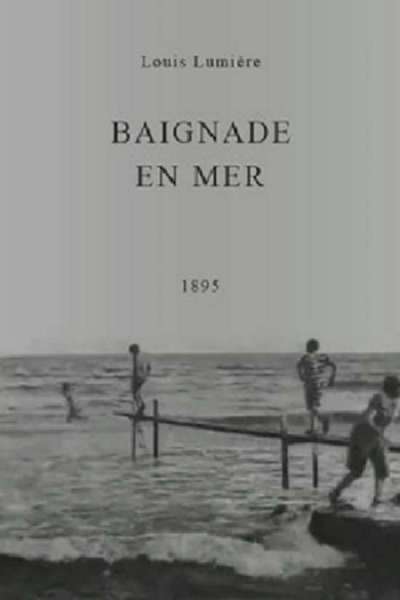The Sea is a french film of genre Documentary directed by Auguste et Louis Lumière
The Sea

If you like this film, let us know!
La Mer (also known as The Sea) is an 1895 French short black-and-white silent documentary film directed and produced by Louis Lumière. Given its age, this short film is available to freely download from the Internet.
The film formed part of the first commercial presentation of the Lumière Cinématographe on December 28, 1895 at the Salon Indien, Grand Café, 14 Boulevard des Capuchins, Paris.
^ "Salon Indien, Grand Café, Paris". Who's Who of Victorian Cinema. Retrieved 2007-04-05.
Synopsis
This 38 second film has a very simple plot in which five men dive repeatedly into stormy water. The men walk along a jetty and then dive into the water, only to then swim to the shore line and repeat the process again.Comments
Leave comment :
Suggestions of similar film to The Sea
There are 25 films with the same director, 8951 with the same cinematographic genres, 6889 films with the same themes (including 3827 films with the same 2 themes than The Sea), to have finally 70 suggestions of similar films.If you liked The Sea, you will probably like those similar films :

Directed by Auguste et Louis Lumière
Origin France
Genres Documentary
Themes Seafaring films, Transport films
Actors Auguste Lumière
Rating51%





A man (Auguste Lumiere) holds his baby daughter (Andrée Lumiere) on a table next to a bowl containing goldfish. The baby begins putting her hand into the water while the man supports her. The scene is filmed by a stationary camera behind the table.

Directed by Auguste et Louis Lumière
Origin France
Genres Drama, Documentary
Themes Seafaring films, Transport films, Documentary films about technology
Rating58%





L'extrémité d'une digue, avec des enfants et des femmes en habit traditionnel. Une barque entre dans le champ de la caméra par la droite, souquée par deux hommes dirigés par un troisième. L'esquif tente de contourner la pointe de la digue, mais la houle la repousse, la met de travers et le contournement est interrompu par la fin du bobineau de pellicule.

Directed by Auguste et Louis Lumière, Auguste Lumière
Origin France
Genres Documentary
Themes Transport films, Rail transport films, Documentary films about technology
Rating73%





Le film montre un train arrivant en gare de La Ciotat, ville proche de Marseille. La famille Lumière possédait une résidence à La Ciotat, ce qui explique le choix de cette gare plutôt que d'une autre.

Origin United-kingdom
Genres Documentary
Themes Seafaring films, Films about sexuality, Transport films
Rating77%






Deep Water (2006)
, 1h32Origin United-kingdom
Genres Drama, Documentary, Action, Adventure
Themes Seafaring films, Sports films, Transport films, Documentary films about sports, Documentary films about technology
Actors Jean Badin, Tilda Swinton, Simon Russell Beale
Rating77%





Un couple qui ne s'aime plus fait un accord: la femme aura le droit d'avoir des amants. Bientôt, ces amants commencent à disparaitre l'un après l'autre.
 , 52minutes
, 52minutesGenres Documentary, Musical
Themes Films set in Africa, Seafaring films, Films about music and musicians, Transport films, Documentary films about music and musicians, Documentaire sur une personnalité, Musical films
African slaves were first brought to Cape Verde by Portuguese settlers in 1462. These slaves brought with them the cultural rhythm and music which would become Batuque: a musical form punctuated by drums while participants danced in a circle. The dance, repressed during the Colonial era, has been adopted as a symbol of the Cape Verdan cultural identity. The film seeks to document the dance form through interviews and performance by the musical group Raiz di Tambarina.

No More Tears Sister (2005)
, 1h18Genres Documentary
Themes Seafaring films, Transport films, Documentary films about law, Documentary films about war, Documentary films about historical events, Documentaire sur une personnalité, Documentary films about politics, Political films
Rating66%






The Mushroom Club (2005)
Origin USA
Genres Documentary
Themes Environmental films, Seafaring films, Transport films, Aviation films, Documentary films about environmental issues, Documentary films about war, Documentary films about historical events, Documentary films about nuclear technology, Documentary films about technology, Political films, Documentary films about World War II
Rating66%






Dear Pyongyang (2006)
, 1h47Directed by Yang Yong-hi
Genres Documentary
Themes Seafaring films, Transport films
Rating76%






The 11th Day (2005)
Genres War, Documentary
Themes Seafaring films, Transport films, Documentary films about war, Documentary films about historical events, Political films, Documentary films about World War II
Rating80%





On May 20, 1941, thousands of elite German paratroopers assaulted the island of Crete. It was the beginning of the Battle of Crete - the largest German airborne operation of World War II. They had expected to control the island within a few days; after all, they only needed to occupy Paris for a week before France surrendered. What they hadn’t expected was that the men, women, and even children of Crete would fight them to their dying breath.
 Connection
Connection